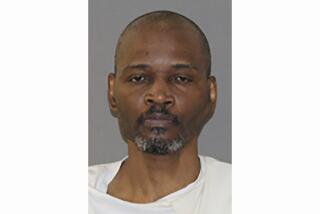Death Sentence Is Upheld in Santa Ana Woman’s Murder
SAN FRANCISCO — Dismissing a claim of racism, the state Supreme Court on Thursday upheld the death sentence for a man convicted of stabbing and strangling a woman who lived next door to him in Santa Ana.
The unanimous ruling rejected arguments by attorneys for Kenneth Clair that a county prosecutor improperly sought to inject race into the murder trial. Clair is black, the victim was white.
Deputy Dist. Atty. Michael Jacobs told jurors during the penalty phase that “we tend sometimes to bend over backwards or sometimes even try to overcompensate for any possible prejudices.”
Jacobs also told jurors that Clair’s race was irrelevant and that they must be “colorblind” in deciding his fate.
In his appeal, Clair’s attorneys argued that Jacobs’ racial references were an improper attempt to exploit anti-black prejudice, couched in neutral language. The Supreme Court disagreed.
“There is not a reasonable likelihood that the jury would have understood the prosecutor to inject (Clair’s) race into the sentencing deliberations,” the opinion by Justice Stanley Mosk said.
Jacobs had made an unobjectionable comment on the need to exclude irrelevant factors in deciding the sentence, Mosk wrote.
Deputy Atty. Gen. Carl Horst said he agreed with Mosk.
“I think Justice Mosk, by virtue of his reputation and his other writings, is very sensitive to these matters,” Horst said of the court’s most liberal member.
Jacobs had been trying to exclude racism from the case, he said, not inject it.
“Racism cuts both ways,” Horst said.
Clair’s attorneys could not be reached for comment.
Clair, who turns 33 Saturday, was convicted of the November, 1984, murder of Linda Faye Rogers, 25, during a burglary. Rogers, who had cerebral palsy, lived with a couple and helped care for their four children and her daughter. Her body was found in a bed with her hands tied. Several items had been stolen.
Clair was a squatter in the house next door. He admitted burglarizing the same home the previous week but denied having anything to do with the fatal killing.
No witnesses or physical evidence connected him with the death, but his lover, Pauline Cody, provided key testimony against him.
Cody testified that she saw Clair the night of the killing carrying two stereo speakers and other items and that he told her he had “just finished beating up a woman.”
She went to the police and agreed to record a conversation with him two months later, in which she asked him about the burglary. Clair did not admit anything but told Cody that no one had seen him enter or leave the house, according to Horst, the state’s lawyer.
The appeal challenged the use of the tape recording. Clair’s attorneys argued that the police, by secretly sending Cody to question Clair after he had become the focus of the murder investigation, violated his right to have a lawyer present during interrogation.
But while a suspect has the right to a lawyer when questioned by police after an arrest, Mosk wrote, the right to a lawyer during interrogation by a police agent applies only after charges are filed.
On another issue, Mosk said that Superior Court Judge Mason Fenton had properly denied a defense request for a new trial after discovering that jurors had accidentally seen a document listing Clair’s entire record, including an assault and burglary that had not been proven.
Mosk said the document, mistakenly placed in the jury room by a court clerk, contained only brief references to incidents that were insignificant considering the valid evidence in the case.
More to Read
Sign up for Essential California
The most important California stories and recommendations in your inbox every morning.
You may occasionally receive promotional content from the Los Angeles Times.








